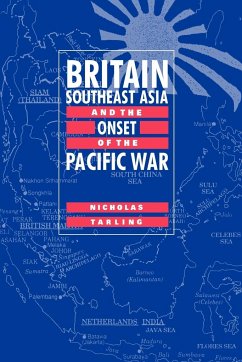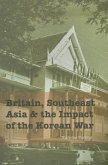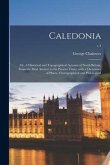This book describes British wartime policy in Asia and the struggle for dominance between Britain/America and Japan.
This book describes British policy in South-East Asia in the early years of World War II. Britain, a major colonial power in Asia at this time, was unable to maintain its military dominance as war with Germany taxed its resources. Instead, Britain attempted to establish diplomatic dominance, trying to avert the Japanese military expansion and total penetration of Asia, and relying on the Americans to help. This book focuses in detail on Britain's wartime relations with Dutch India, the Philippines, French Indo-China and Thailand. It is an important reinterpretation of the origins of the Pacific War which escalated European conflict into a world war.
Review quote:
'Nicholas Tarling has produced a judiciously argued, thorough examination of the role fulfilled by Southeast Asia within the context of the immediate origins of the Pacific conflict -Tarling presents a clear and reliable guide through the complexities of this topic.' Peter Lowe, English Historical Review
'Professor Tarling's kind of detailed historical analysis is the only way in which historians can hope to understand the sudden and irreversible transformation which overwhelmed colonial power in South-East Asia. He himself is an acknowledged master of such analysis, and of the British, American and Australian government archives that are needed to trace the course of such events - a major contribution to the framework of historical reference within which further research must continue.' Journal of the Royal Asiatic Society
Table of contents:
Preface; Maps; 1. Before September 1939; 2. September 1939-June 1940; 3. July-September 1940; 4. October 1940-June 1941; 5. July-December 1941; Conclusion; Personalia; Notes; Bibliography; Index.
Hinweis: Dieser Artikel kann nur an eine deutsche Lieferadresse ausgeliefert werden.
This book describes British policy in South-East Asia in the early years of World War II. Britain, a major colonial power in Asia at this time, was unable to maintain its military dominance as war with Germany taxed its resources. Instead, Britain attempted to establish diplomatic dominance, trying to avert the Japanese military expansion and total penetration of Asia, and relying on the Americans to help. This book focuses in detail on Britain's wartime relations with Dutch India, the Philippines, French Indo-China and Thailand. It is an important reinterpretation of the origins of the Pacific War which escalated European conflict into a world war.
Review quote:
'Nicholas Tarling has produced a judiciously argued, thorough examination of the role fulfilled by Southeast Asia within the context of the immediate origins of the Pacific conflict -Tarling presents a clear and reliable guide through the complexities of this topic.' Peter Lowe, English Historical Review
'Professor Tarling's kind of detailed historical analysis is the only way in which historians can hope to understand the sudden and irreversible transformation which overwhelmed colonial power in South-East Asia. He himself is an acknowledged master of such analysis, and of the British, American and Australian government archives that are needed to trace the course of such events - a major contribution to the framework of historical reference within which further research must continue.' Journal of the Royal Asiatic Society
Table of contents:
Preface; Maps; 1. Before September 1939; 2. September 1939-June 1940; 3. July-September 1940; 4. October 1940-June 1941; 5. July-December 1941; Conclusion; Personalia; Notes; Bibliography; Index.
Hinweis: Dieser Artikel kann nur an eine deutsche Lieferadresse ausgeliefert werden.








